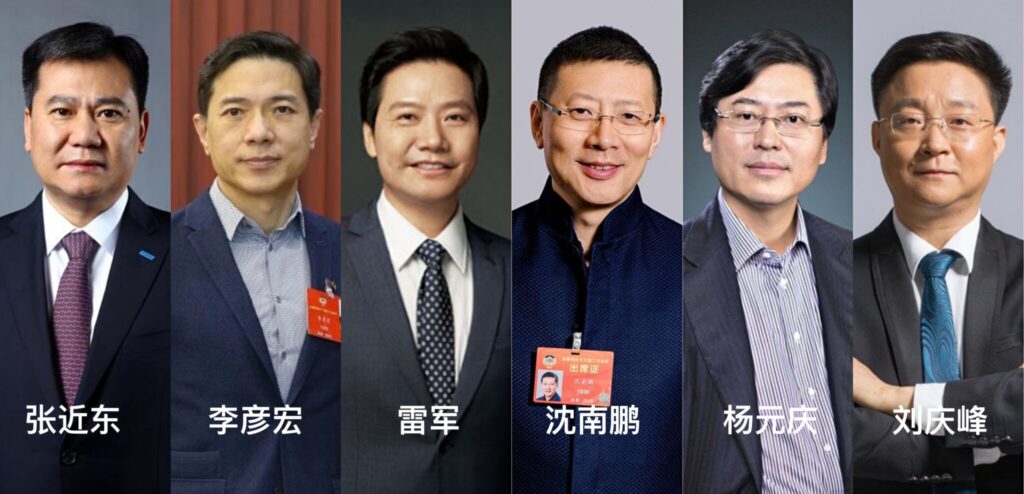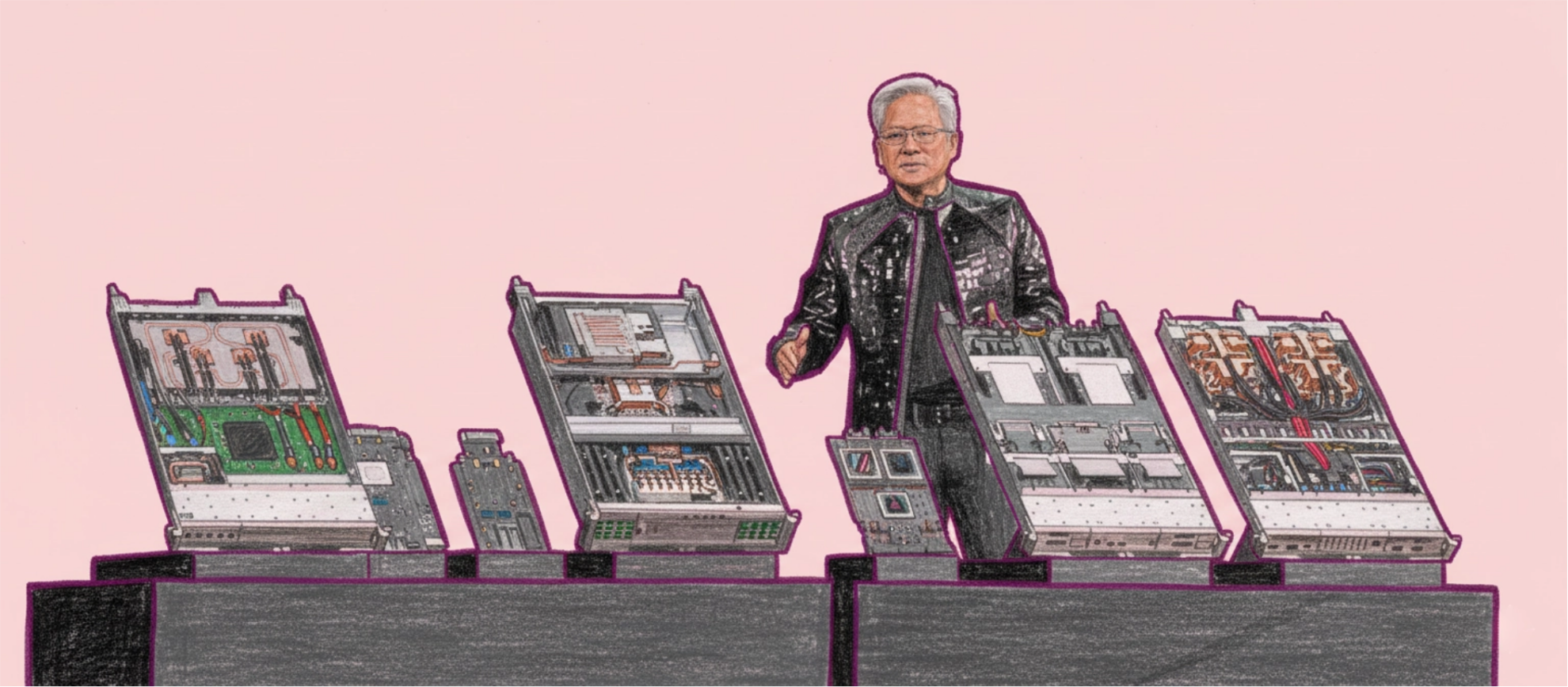Command Palette
Search for a command to run...
The Two Sessions Closed: Tech Industry Leaders Put Forward These AI Proposals

On March 10 and 11, the two sessions closed successively. In recent years, "artificial intelligence" has become an indispensable topic at the two sessions. What proposals on artificial intelligence were made at this year's two sessions?
The Fourth Session of the 13th National Committee of the Chinese People's Political Consultative Conference and the Fourth Session of the 13th National People's Congress closed on the afternoon of March 10 and 11, respectively.
Among the many suggestions from representatives and deputies, artificial intelligence was mentioned many times, becoming one of the focuses of the two sessions and attracting the attention of the whole nation.
These proposals and suggestions on artificial intelligence involve various aspects such as transportation, education, medical care, and elderly care. Chao Shenjue has sorted them out through public information.
Shen Nanpeng and Li Yanhong: AI helps smart transportation

Artificial Intelligence Helps Achieve Carbon Peak
As the only CPPCC member in China's venture capital field, Sequoia China, led by Neil Shen, focuses on investments in science and technology, industrial technology and other fields, and has accumulated deep insights and experience in digitalization, informatization and technological empowerment.
His proposals at the two sessions focused on using the power of scientific and technological innovation to solve social issues. In the proposal on carbon peak, "Road traffic is committed to low carbonization, and artificial intelligence helps carbon peak",He suggested vigorously developing the application of artificial intelligence in road traffic, reducing the intensity of private car use, accelerating the optimization of road operation efficiency, and strengthening the accurate measurement of traffic carbon emissions.
Specifically, AI can help in the following areas:
- Controlling private car traffic demand is the key direction for deep emission reduction. AI and networking can guide the reduction of the intensity of private car use;
- Congestion and inadequate urban planning can also exacerbate emissions. AI can help accelerate the optimization of road operation efficiency.
- Emission monitoring and accounting of road mobile sources is relatively difficult, and vehicle networking and big data can provide technical support.
Note: Carbon peak means that at a certain point in time, carbon dioxide emissions no longer grow and reach a peak, and then gradually decline.

Accelerate the commercialization of autonomous driving and the popularization of intelligent transportation
In "Accelerating the Commercialization of Autonomous Driving and the Popularization of Intelligent Transportation", Robin Li stated that transportation is one of the people's most concerned livelihood issues and one of the important areas of carbon emissions.
Vigorously developing low-carbon transportation, utilizing new technologies such as artificial intelligence and 5G, and accelerating the commercial use of autonomous driving and the popularization of intelligent transportation can effectively alleviate traffic congestion, make travel more green and convenient for the people, and achieve coordinated unity between carbon peak and high-quality economic development.
In this regard, he suggested thatFurther strengthen policy innovation at the national level, support the commercial use of autonomous driving and the popularization of intelligent transportation, meet the people's needs for better travel, and achieve the goal of carbon peak in the transportation sector as soon as possible.
Zhang Jindong: Strengthening the security of data circulation

Establish a data governance committee to strengthen data resource security
In the context of a digital economy and society, behaviors such as information leakage and excessive acquisition of permissions are emerging in an endless stream, and data circulation and security have attracted much attention.
Zhang Jindong suggested strengthening top-level design.Establish a data governance committee as the leading body for data resource sharing management, and establish a national data sharing platform.
While ensuring data openness and sharing, we must also strengthen the integration, sharing and circulation security of data resources.
In addition, Zhang Jindong suggested establishing general education on the social sharing of public data so that students can establish an understanding and knowledge of the foundation, management, application and protection of big data from the moment they enter campus, cultivate a forward-looking consciousness, further build the value goals of the big data knowledge system, and achieve the extensive training of more high-level talents.
Liu Qingfeng and Yu Minhong: AI improves education

Using artificial intelligence to promote the national common language
Liu Qingfeng, a member of the National People's Congress and chairman of iFLYTEK, proposed using artificial intelligence to solve the "proposition of the times". The seven written suggestions he submitted all revolved around artificial intelligence and involved promoting the development of social undertakings such as education and medical care.
Among them, in "Using Artificial Intelligence Technology to Promote and Popularize the National Common Language", he proposed using artificial intelligence to promote and popularize the national common language.
Mandarin is the national common language promoted by my country among all regions and ethnic groups. However, the current problem of insufficient popularization of Mandarin is still prominent.
Data from the Ministry of Education show that as of September 2020, the national Mandarin penetration rate was 80.72%, while the Mandarin penetration rate in relatively poor areas was only 61.56%.
Liu Qingfeng said that artificial intelligence technology has played an increasingly important role in language learning, so he suggestedRelying on artificial intelligence and Internet technology, we will build a national common language and writing teaching platform, and implement a learning model that combines offline teaching and online learning to help people of all ethnic groups quickly improve their level of application of the national common language and writing.
It is understood that there are currently applications such as AI Mandarin "teachers", AI Mandarin assessments, and Mandarin promotion games that have penetrated into rural and remote areas to accelerate the promotion of local Mandarin.

Using artificial intelligence to improve English teaching in rural primary schools
Yu Minhong, member of the National Committee of the Chinese People's Political Consultative Conference and chairman of New Oriental Education & Technology Group, suggested in his proposal that artificial intelligence be used to improve the level of English teaching in rural primary schools, lay a solid foundation for rural students' subsequent learning, and narrow the urban-rural education gap.
The shortage of English teachers is a problem faced by many rural schools. According to a survey of more than 500 rural primary schools in 20 provinces across the country, the average teacher-student ratio for English is 1:227, and in some areas it even reaches 1:2400, and teachers are in urgent need of supplementation.
To this end, Yu Minhong proposed the following around the application of artificial intelligence technology:Utilize artificial intelligence technology to integrate high-quality English teaching resources at home and abroad, eliminate regional differences in teaching resources and teaching levels; strengthen the interactive experience in English classrooms and improve the quality and efficiency of English learning for rural children.
Lei Jun, Yang Yuanqing, and Li Yanhong: Promoting technology for the elderly
From the proposals currently made public, we can see that "technology suitable for the elderly" has become a hot topic at the two sessions.
The number of elderly people and the number of people using the Internet in my country are growing day by day. According to the Ministry of Civil Affairs, during the 14th Five-Year Plan period, the size of my country's elderly population will grow rapidly at a rate of more than 10 million per year, and by 2025, the population aged 60 and above may exceed 300 million.
At the same time, with the increasing penetration of the Internet and smart technologies in life, the elderly are increasingly facing difficulties and challenges brought about by these emerging technologies.
During this year's two sessions, many representatives and delegates paid attention to this issue and put forward suggestions.

Using smart technology to help the elderly better integrate into digital life
Lei Jun, deputy to the National People's Congress and chairman and CEO of Xiaomi Group, submitted three proposals to the two sessions, one of which was "Suggestions on using smart technology to help the elderly better integrate into digital life."
Among them, it is recommended to promote the inclusion of digital services for the elderly into the national information infrastructure construction as soon as possible; guide the establishment of a standard system for the adaptability of intelligent technology to the elderly; strengthen the linkage between the smart home data and smart community data of the elderly; make full use of artificial intelligence Internet of Things technology to quickly respond to active needs, and promptly and accurately identify passive needs (for example, falls, fires, gas leaks, etc.), and improve the coordination and management capabilities of community elderly assistance services.
At the same time, we will improve laws and regulations and ensure data security and privacy protection for the elderly.

Using information technology to help the elderly better enjoy intelligent services
Yang Yuanqing, deputy to the National People's Congress and chairman and CEO of Lenovo Group, submitted a proposal entitled "Suggestions on using information technology to effectively solve the difficulties faced by the elderly and help the 'silver generation' cross the 'digital divide'."
Provide suggestions on product, service and security levels.Enterprises are encouraged to launch smart terminal products that better meet the needs of the elderly. At the same time, all kinds of smart applications should fully consider the actual needs and operability of the elderly.We cannot "one size fits all" shut down manual services, so that the elderly can better become participants and beneficiaries of the digital economy and achieve the good of technology.

Accelerate the promotion of smart elderly care in the community
Li Yanhong, member of the National Committee of the Chinese People's Political Consultative Conference and CEO of Baidu, pointed out that currently 90% of the elderly rely on community home care, and only a small number of communities can truly provide systematic elderly care services. Most grassroots communities are short of manpower and incomplete facilities, and the service form and content are difficult to meet the needs.
In this regard, he suggested that relevant departments should strengthen policy guidance.Encourage more smart devices to enter communities to expand and deepen smart elderly care services.
Liu Qingfeng: Accelerate the application of AI in primary care

Accelerate the application of artificial intelligence in primary healthcare in my country
Faced with the structural problems of the relative scarcity of high-quality medical resources and insufficient primary medical service capacity in my country, Liu Qingfeng suggested in his proposal "Accelerating the Application of Artificial Intelligence in Primary Medical Care in my country and Building a Healthy China":
Increase research on key artificial intelligence technologies in the medical field, and strengthen the training of medical artificial intelligence talents and artificial intelligence literacy among grassroots doctors.
In addition, in response to the problems of weak early monitoring and early warning capabilities, low monitoring density and breadth, and untimely early warning in the prevention and control of infectious diseases and major diseases, he proposed in "Using Artificial Intelligence Technology to Establish a National Intelligent Prevention and Control System for Infectious Diseases and Major Dangerous Diseases":
On the basis of the existing ones, we will accelerate the construction and application promotion of early monitoring and early warning platforms for infectious diseases based on artificial intelligence.Improve the ability of doctors in primary medical and health institutions to identify, diagnose and directly report infectious diseases and major diseases.Effectively expand the scope of infectious disease and major disease monitoring, greatly shorten the response time of infectious disease monitoring and early warning, and achieve the "four early" goals of infectious disease prevention and control.
Pei Chunliang and You Yi: Using AI to improve the mechanism for preventing wrongful convictions


Using big data and artificial intelligence technology to improve the mechanism for preventing wrongful convictions
As one of the top ten legal supervision cases in 2020, "Correcting the Zhang Yuhuan Case" was a topic of great concern to the representatives at the Fourth Session of the 13th National People's Congress.
In order to correct unjust, false and wrong cases such as the Zhang Yuhuan case, National People's Congress deputies Pei Chunliang and You Yi proposed at the conference to use big data and artificial intelligence technology to improve the mechanism for preventing wrongful convictions.
Representative Pei Chunliang believes that to prevent the occurrence of unjust, false and wrongly convicted cases, we must start from the source and continuously improve the mechanism for preventing wrongly convicted cases.Make full use of modern information technologies such as big data and artificial intelligence, and combine them with intelligent case-handling assistance systems to guide judicial organs to collect and examine evidence in accordance with the law, comprehensively and in a standardized manner.
AI solutions in the two sessions are expected to be implemented
Artificial intelligence is undoubtedly a high-frequency word in this year's two sessions, and it is no longer just a topic of concern in the technology circle.
This is not only because it is becoming an indispensable part of our lives, but also because it has greater potential and possibilities in all aspects of future society and will bring profound changes to various fields.
These proposals may be submitted quickly or may still take a long time to be implemented. But we believe that with the rapid development of artificial intelligence technology, these suggestions on using technology to benefit society will gradually become a reality.
Sources:








